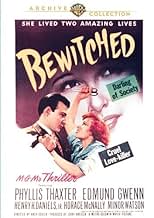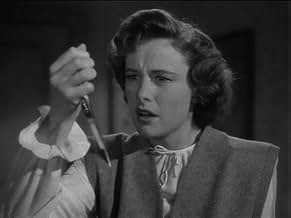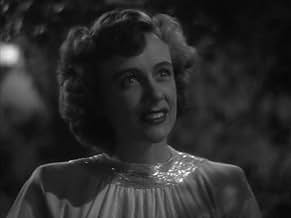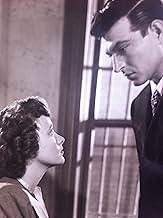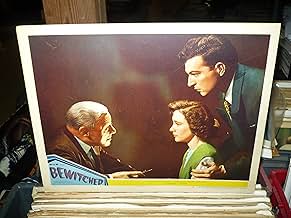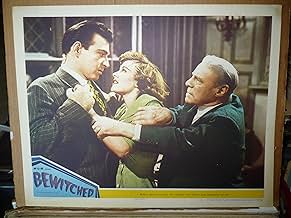A young woman has two distinct personalities, one of whom is evil and constantly gets her in trouble.A young woman has two distinct personalities, one of whom is evil and constantly gets her in trouble.A young woman has two distinct personalities, one of whom is evil and constantly gets her in trouble.
Stephen McNally
- Eric Russell
- (as Horace McNally)
Tom Coleman
- Juror
- (uncredited)
Clancy Cooper
- Cop
- (uncredited)
Eddie Dunn
- Prison Janitor
- (uncredited)
George Meader
- Juror
- (uncredited)
Howard M. Mitchell
- Juror
- (uncredited)
Featured reviews
A woman on death row is discovered to have a split personality in "Bewitched," a 1945 film starring Phyllis Thaxter, Edmund Gwenn, and Stephen McNally. Thaxter is a young, soon to be wed woman who has blackouts, walks around at night, and hears voices. She runs away from her parents' home and her husband to be and goes to New York, gets a job, and meets an attorney (McNally) who falls for her. Her fiancé finds her, and, under orders from her other personality (voiced by Audrey Totter), she kills him.
Now we're brought back to death row where Edmund Gwenn suspects her problem and wants to hypnotize her.
Boring film with a good cast nonetheless, psychiatric disorders being a fashionable subject during and after World War II. What made Three Faces of Eve interesting was that the main character was a woman with a dull affect, but her personalities had lots of spark. Just hearing the voice of Totter here isn't enough. If Thaxter had actually been taken over by her alternate personality and, say, lived as her in New York, the film would have been a lot more interesting.
Not very good.
Now we're brought back to death row where Edmund Gwenn suspects her problem and wants to hypnotize her.
Boring film with a good cast nonetheless, psychiatric disorders being a fashionable subject during and after World War II. What made Three Faces of Eve interesting was that the main character was a woman with a dull affect, but her personalities had lots of spark. Just hearing the voice of Totter here isn't enough. If Thaxter had actually been taken over by her alternate personality and, say, lived as her in New York, the film would have been a lot more interesting.
Not very good.
Average yet enteraining story about a young girl being plagued with a voice inside telling her what to do. The girl breaks down and listens to the voice, moving across country leaving her family and fiancée behind to make a new start. The film then has a new man come into the girl's life when old wounds are re-opened and tragedy strikes. While nothing particularly inventive takes place, I rather liked the mood created throughout the film. The film opens with the female protagonist in jail for a crime she didn't yet did commit. Phyllis Thaxter as Joan, the troubled young lady with multiple personalities living inside her, gives a more than competent portrayal of this tortured woman, yet the film's story is rather weak and completely falls apart in the last third when some ridiculous scientific explanation is given for her aberrant behaviour. Edmund Gwenn plays a psychiatrist/family friend and gives the film a bit of credibility with his performance. The rest of the cast is adequate and the film is mildly entertaining. Hypnosis, the gas chamber, and playing with scissors are all explored.
No need to repeat the plot. The force behind the movie is Arch Oboler, an established radio heavyweight at the time. From his credits, it looks like he kept searching for a handle in Hollywood but never quite found it. Certainly, it wasn't from lack of imagination—his 1951 film "Five" dealt with nuclear post-apocalypse in a resourceful and compelling way at a time when no studio would touch the subject. That same bold imagination is evident in this movie as well. The professionals dismiss the film as "heavy-handed", which it is. However, there are compensations that are too easily overlooked.
Aside from Thaxter's fine performance, the movie contains several profoundly imaginative touches. Catch that moody dollying shot down the deserted city street that finally fixes on a cringing Thaxter hiding behind an open doorway. Not only is it great atmosphere, but it also sort of sums up Thaxter's predicament. She's afraid to come out into the world for risk of immediate exposure, so she clings fearfully to a hidden world where only she exists. It's a well-conceived and artfully executed passage. Then there's that darn-near sublime set-up with Thaxter huddled in a concert hallway while we see a long-shot of a vocalist pinpointed by a thin beam of light. The woman intones a mournful version of My Old Kentucky Home, like the proverbial voice in the darkened wilderness. It may be the only glimpse we get of Thaxter's true inner self, summed up poetically.
But the overly literal side does unfortunately predominate, and I wish someone had more confidence in audience imagination. For one thing, that would have eliminated the two hokey doppelgangers in the exorcism scene. Also, the conventional happy ending is much too pat for the problem being dealt with, but is indicative of the time. And if I'm not mistaken, there's a quick reference from Gwenn to Thaxter's problem as being genetic, as if a multiple personality trait can be passed along in the genes. I'm no clinical psychologist, but I doubt seriously this is the prevailing view. Anyway, it's too bad Oboler couldn't get a better handle on Hollywood. I think his credits showed genuine promise. This movie may be unfortunately flawed (perhaps because of studio dictates), but the very real compensations should not be overlooked.
Aside from Thaxter's fine performance, the movie contains several profoundly imaginative touches. Catch that moody dollying shot down the deserted city street that finally fixes on a cringing Thaxter hiding behind an open doorway. Not only is it great atmosphere, but it also sort of sums up Thaxter's predicament. She's afraid to come out into the world for risk of immediate exposure, so she clings fearfully to a hidden world where only she exists. It's a well-conceived and artfully executed passage. Then there's that darn-near sublime set-up with Thaxter huddled in a concert hallway while we see a long-shot of a vocalist pinpointed by a thin beam of light. The woman intones a mournful version of My Old Kentucky Home, like the proverbial voice in the darkened wilderness. It may be the only glimpse we get of Thaxter's true inner self, summed up poetically.
But the overly literal side does unfortunately predominate, and I wish someone had more confidence in audience imagination. For one thing, that would have eliminated the two hokey doppelgangers in the exorcism scene. Also, the conventional happy ending is much too pat for the problem being dealt with, but is indicative of the time. And if I'm not mistaken, there's a quick reference from Gwenn to Thaxter's problem as being genetic, as if a multiple personality trait can be passed along in the genes. I'm no clinical psychologist, but I doubt seriously this is the prevailing view. Anyway, it's too bad Oboler couldn't get a better handle on Hollywood. I think his credits showed genuine promise. This movie may be unfortunately flawed (perhaps because of studio dictates), but the very real compensations should not be overlooked.
Bewitched (1945)
** 1/2 (out of 4)
Joan Alris Ellis (Phyllis Thaxter) is your typical young woman. She's happy, healthy and looking forward to her upcoming marriage but then she begins to hear voices. Soon these voices are taking over her life so she runs away from her fiancé and family hoping to find some peace but soon she murders a man. Was it her or the voices?
BEWITCHED is a pretty interesting film that has a lot of creative moments and it's certainly a film that's ahead of its time. It certainly fits in quite well with the film noir from this era but there are plenty of horror elements and you could really argue that it touched on some similar subjects that Alfred Hitchcock would do fifteen years later in PSYCHO. Sadly, not all of the elements come together as well as they should but there's no question that the film is worth watching.
The best thing working for the film is Arch Oboler's direction because he keeps the film moving at a rather nice pace and he also handles the various elements quite nicely. I thought the psychological aspect of the film was the highlight because there are several scenes where the lead character battles with herself and these are extremely effective. I also thought the noir aspect with the cinematography was good. I think the film loses some of its power during the finale, which I won't spoil but it was a tad bit too sappy for me.
Thaxter is good in the lead and performs both characters very well. Edmund Gwenn, Henry H. Daniels, Jr. and Addison Richards are also good in their parts. BEWITCHED was certainly ahead of its time and deserves a lot of credit for the subject matter.
** 1/2 (out of 4)
Joan Alris Ellis (Phyllis Thaxter) is your typical young woman. She's happy, healthy and looking forward to her upcoming marriage but then she begins to hear voices. Soon these voices are taking over her life so she runs away from her fiancé and family hoping to find some peace but soon she murders a man. Was it her or the voices?
BEWITCHED is a pretty interesting film that has a lot of creative moments and it's certainly a film that's ahead of its time. It certainly fits in quite well with the film noir from this era but there are plenty of horror elements and you could really argue that it touched on some similar subjects that Alfred Hitchcock would do fifteen years later in PSYCHO. Sadly, not all of the elements come together as well as they should but there's no question that the film is worth watching.
The best thing working for the film is Arch Oboler's direction because he keeps the film moving at a rather nice pace and he also handles the various elements quite nicely. I thought the psychological aspect of the film was the highlight because there are several scenes where the lead character battles with herself and these are extremely effective. I also thought the noir aspect with the cinematography was good. I think the film loses some of its power during the finale, which I won't spoil but it was a tad bit too sappy for me.
Thaxter is good in the lead and performs both characters very well. Edmund Gwenn, Henry H. Daniels, Jr. and Addison Richards are also good in their parts. BEWITCHED was certainly ahead of its time and deserves a lot of credit for the subject matter.
Prototype Film-Noir from Stylist Arch Oboler who made His Name on the Radio with His Ultra-Popular "Lights Out" Program. Here He Adopts His Own Story "Alter-Ego" and brings it to the Screen for MGM.
This is One of the Few MGM Noirs of the First Wave. It would Take Years before the Haughty Studio would lend its Name Seriously to a Style so Dark.
Phyllis Thaxter gives a Good Performance in a Soul-Baring Role. Steve McNally is Miscast but manages to look Desperate and Edmund Gwenn as the Psychiatrist trying to Exorcise Thaxter's other Personality, the Evil One, is a Good Try.
With its Roots in Dr. Jekyll and Mr. Hyde, the only Reference Point at this Point for Multiple Personalities On Screen, Oboler delivers and Ultra-Stylish Descent into Schizophrenia.
The Film is Guilty of way too Much Verbiage, a Radio Drama influence, but it Balances it with Film Flourishes that are Atmospheric and Stunning.
The Movie Grips the Audience as it tries to Explain and Expose Psychiatric Methods and Procedures. But the Truth is that Not Much was Known at the Time and the Little that was Known was constantly Up for Debate in the Medical Community.
So it was No Easy Task Transferring this to the Movies. For Years Hollywood gave it a go with Extremely Inconsistent Results. It Was a Staple in Film-Noir and the Horror of Val Lewton but Main Stream and "A" Pictures were Reluctant to take it on for quite Some Time.
Overall, this is a Great Early Effort and a Striking Example of Film-Noir and the Psychological Pictures that Started a Run After the War and Never Stopped, and actually becoming a Genre of its own (The Psychological Thriller).
This is One of the Few MGM Noirs of the First Wave. It would Take Years before the Haughty Studio would lend its Name Seriously to a Style so Dark.
Phyllis Thaxter gives a Good Performance in a Soul-Baring Role. Steve McNally is Miscast but manages to look Desperate and Edmund Gwenn as the Psychiatrist trying to Exorcise Thaxter's other Personality, the Evil One, is a Good Try.
With its Roots in Dr. Jekyll and Mr. Hyde, the only Reference Point at this Point for Multiple Personalities On Screen, Oboler delivers and Ultra-Stylish Descent into Schizophrenia.
The Film is Guilty of way too Much Verbiage, a Radio Drama influence, but it Balances it with Film Flourishes that are Atmospheric and Stunning.
The Movie Grips the Audience as it tries to Explain and Expose Psychiatric Methods and Procedures. But the Truth is that Not Much was Known at the Time and the Little that was Known was constantly Up for Debate in the Medical Community.
So it was No Easy Task Transferring this to the Movies. For Years Hollywood gave it a go with Extremely Inconsistent Results. It Was a Staple in Film-Noir and the Horror of Val Lewton but Main Stream and "A" Pictures were Reluctant to take it on for quite Some Time.
Overall, this is a Great Early Effort and a Striking Example of Film-Noir and the Psychological Pictures that Started a Run After the War and Never Stopped, and actually becoming a Genre of its own (The Psychological Thriller).
Did you know
- TriviaAudrey Totter dubbed Thaxter's evil personality's voice.
- Quotes
Joan Alris Ellis: Bob, do you hear... someone talking?
- ConnectionsFeatured in The Late, Late Show: Bewitched (1962)
Details
- Runtime1 hour 5 minutes
- Color
- Aspect ratio
- 1.37 : 1
Contribute to this page
Suggest an edit or add missing content



